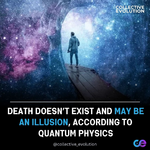Actually, there is scientific 'proof' of some form of continuity after death as shown by the Einstein's equation of energy/mass and the laws of thermodynamics. Again though, the extrapolation/interpretation/understanding of such 'after death' becomes subjective according to an individual's biases and personal experiences...
*LOL* I apparently have equines on the brain as I used the word equines instead of equal in my previous post. I have corrected that 'error'. Yes
@BrotatoChip, I have stated that for 'classification' purposes I'm a spiritual agnostic.
Here's something else to consider:
Quantum physics has sparked some fascinating conversations about the nature of reality, and among these is the provocative idea that death, as we understand it, may be an illusion.
At its core, quantum physics reveals a universe that is far less fixed and more interconnected than we once believed. Key experiments challenge our traditional understanding of time, space, and matter -concepts that form the foundation of our views on life and death.
What does this mean for death? If consciousness plays a central role in shaping reality, as some interpretations of quantum physics suggest, then the "end" of physical life might not be the end of consciousness. Instead, consciousness could exist independently of the physical body, continuing in a way that transcends space and time.
This aligns with theories like **biocentrism**, which proposes that life and consciousness create the universe, not the other way around. In this view, death is not the cessation of existence but a transition - like stepping into another dimension of the multiverse.
Even time itself isn’t as linear as we perceive it. Experiments have shown that particles can retroactively change their state based on future observations. If time isn’t a strict sequence of past, present, and future, then perhaps what we call "death" is merely a shift in perception, not a true endpoint.
While quantum physics doesn’t directly prove life after death, it challenges the materialist view that life is confined to the physical body. By revealing a universe that is non-linear, interconnected, and influenced by consciousness, it opens the door to the possibility that death, as we understand it, might not be the full story.
So, could death be an illusion? Quantum physics invites us to question our assumptions and consider that what feels like an ending might actually be something far more mysterious and expansive.



